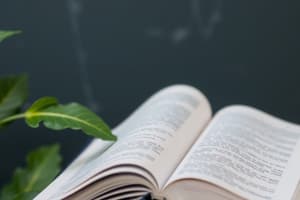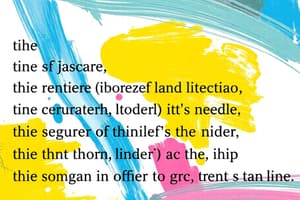Podcast
Questions and Answers
Which type of conjunction connects independent clauses?
Which type of conjunction connects independent clauses?
- Coordinating (correct)
- Conjunctive
- Subordinating
- Correlative
What does a dependent clause fail to do?
What does a dependent clause fail to do?
- Contain a subject and verb
- Provide necessary details
- Connect other clauses
- Express a complete thought (correct)
Which of the following is an example of an interrogative sentence?
Which of the following is an example of an interrogative sentence?
- Do you enjoy reading? (correct)
- The sky is blue.
- Clean your room.
- What a wonderful day!
What is the primary function of a topic sentence in a paragraph?
What is the primary function of a topic sentence in a paragraph?
Which type of conjunction includes the pairs 'either/or' and 'neither/nor'?
Which type of conjunction includes the pairs 'either/or' and 'neither/nor'?
Which of the following is NOT a function of exclamatory sentences?
Which of the following is NOT a function of exclamatory sentences?
What type of source is a diary or journal classified as?
What type of source is a diary or journal classified as?
Which of the following would categorize as a secondary source?
Which of the following would categorize as a secondary source?
What determines whether a newspaper article is a primary or secondary source?
What determines whether a newspaper article is a primary or secondary source?
Which of the following is an advantage of using primary sources?
Which of the following is an advantage of using primary sources?
What is a key disadvantage of using secondary sources?
What is a key disadvantage of using secondary sources?
Which of the following is considered a secondary source?
Which of the following is considered a secondary source?
What can context clues help you to do?
What can context clues help you to do?
What is a potential drawback of using biographies as primary sources?
What is a potential drawback of using biographies as primary sources?
What type of sources are encyclopedias classified as?
What type of sources are encyclopedias classified as?
Which of these options describes a primary source?
Which of these options describes a primary source?
Flashcards
Independent Clause
Independent Clause
A group of words with a subject and verb that expresses a complete thought.
Dependent Clause
Dependent Clause
A group of words with a subject and verb that does not express a complete thought.
Coordinating Conjunctions
Coordinating Conjunctions
Words used to connect words or independent clauses (e.g., for, and, nor, but, or, yet, so).
Subordinating Conjunctions
Subordinating Conjunctions
Signup and view all the flashcards
Declarative Sentence
Declarative Sentence
Signup and view all the flashcards
Interrogative Sentence
Interrogative Sentence
Signup and view all the flashcards
Primary Sources
Primary Sources
Signup and view all the flashcards
Paragraph
Paragraph
Signup and view all the flashcards
Secondary Source
Secondary Source
Signup and view all the flashcards
Almanac
Almanac
Signup and view all the flashcards
Encyclopedia
Encyclopedia
Signup and view all the flashcards
Biography
Biography
Signup and view all the flashcards
Textbook
Textbook
Signup and view all the flashcards
Internet Research
Internet Research
Signup and view all the flashcards
Context Clues
Context Clues
Signup and view all the flashcards
Study Notes
Conjunctions
- A word used to connect clauses or sentences, or to coordinate words in the same clause.
- Independent Clause: A group of words containing a subject and verb, expressing a complete thought. Example: "Our planets revolve around the sun."
- Dependent Clause: A group of words containing a subject and verb, but not expressing a complete thought. Example: "If Denise comes to class late."
- Coordinating Conjunctions: Join words and independent clauses. Examples: for, and, nor, but, or, yet, so.
Kinds of Sentences
- Declarative: Used to convey information or make statements. Example: "I can play the violin."
- Interrogative: Used to ask questions. Example: "Can you help me?"
- Imperative: Used to issue orders or directives. Example: "Do your homework."
- Exclamatory: Used to make exclamations. Example: "You look so beautiful!"
Paragraph Parts
- Paragraph: A group of sentences conveying a single idea.
- Topic Sentence: Clearly states the paragraph's subject.
- Supporting Sentences: Provide details and support the main idea.
- Concluding Sentence: Often restates or summarizes the main idea.
Subordinating Conjunctions
- Add dependent clauses to independent clauses. Examples: although, because, if, since, unless, until, whenever.
Correlative Conjunctions
- Connect concepts of equal importance. Examples: neither/nor, either/or, not only/but also, as/as.
Primary and Secondary Sources
- Primary Sources: Documented and verified accounts of events firsthand (e.g., war veteran's experience, photographs, letters, etc.).
- Secondary Sources: Accounts written about a primary source after the event (e.g., biographies, textbooks, encyclopedias).
- Advantages: Offer filtered, expert-verified information; provide different perspectives.
- Disadvantages: May not be perfectly accurate; may offer an interpretation rather than the exact event information.
- Diaries/Journals: Daily records (e.g., The Diary of Anne Frank).
- Speeches: Formal talks (e.g., "I Have a Dream" by Martin Luther King Jr.).
- Historical Documents: Reliable accounts containing details about events/persons/places (e.g., birth certificates, government records, deeds, military records).
Internet Research
- Ways to collect data via the internet (also known as Internet research, internet science, or web-based methods).
Context Clues
- Hints in a text that help determine the meaning of an unfamiliar word.
- The clue can appear in the same sentence or a preceding sentence.
- Important for increasing your vocabulary.
- Types of context clues:
- Synonym: A word with the same meaning is used in the sentence.
- Antonym: A word with the opposite meaning is used in the sentence.
- Explanation: The unknown word is explained within the sentence or in the previous sentence.
- Example: Specific examples are used to define the term.
Published First-Hand Accounts
- Documented, verified accounts of people who experienced an event.
- Examples (but not listed in this text): Photographs, footages, videos, newspaper articles, letters, magazines.
Encyclopedias and Biographies
- Encyclopedias are sets of books providing information across subjects.
- Biographies are detailed accounts of someone's life written by another person.
Textbooks
- Informative books used for specific academic courses.
Advantages and Disadvantages of Different Sources
- Advantages and Disadvantages are specific to the type of source, not a general rule.
Studying That Suits You
Use AI to generate personalized quizzes and flashcards to suit your learning preferences.




